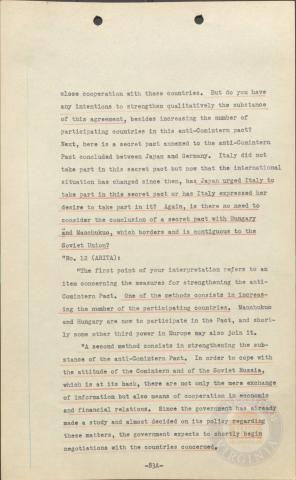
Page 83A
| Parent | Collaboration Between Japan, Germany and Italy - Volume II |
|---|---|
| Date | 25 November 1941 |
| Language | English |
| Collection | Tavenner Papers & IMTFE Official Records |
| Box | Box 15 |
| Folder | Japan, Germany, Italy Collaboration Vol 2 |
| Repository | University of Virginia Law Library |
close cooperation with these countries. But do you have any intentions to strengthen qualitatively the substance of this agreementj besides increasing the number of participating countries in this anti-Comintern pact? Next, here is a secret pact annexed to the anti-Comintern Pact concluded between Japan and Germany. Italy did not take part in this secret pact but now that the international situation has changed since then, has Japan urged Italy to take part in this secret pact or has Italy expressed her desire to take part in it? Again, is there no need to consider the conclusion of a secret pact with Hungary and Manchukuo, which borders and is contiguous to the Soviet Union? "No. 12 (ARITA)l
"The first point of your interpretation refers to an item concerning the measures for strengthening the anti- Comintern Pact. One of the methods consists in increas- ing the number of the participating countries. Manchukuo and Hungary are now to participate in the Pact, and short¬ly some other third power in Europe may also Join it.
"A second method consists in strengthening the sub¬stance of the anti-Comintern Pact. In order to cope with the attitude of the Comintern and of the Soviet Russia, which is at its back, there are not only the mere exchange of information but also means of cooperation in economic and financial relations. Since the government has already made a study and almost decided on its policy regarding these matters, the government expects to shortly begin negotiations with the countries concerned.
